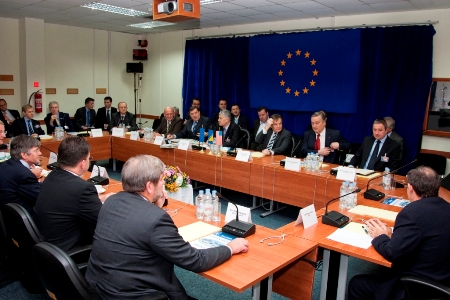 Three former envoys to Bosnia have issued a joint statement critiquing the latest EU-US effort to end the country’s political crisis and proposing a new international approach.
Three former envoys to Bosnia have issued a joint statement critiquing the latest EU-US effort to end the country’s political crisis and proposing a new international approach.
The statement was issued by Wolfgang Petritsch, Paddy Ashdown and Christian Schwarz-Schilling, who served as high representatives to Bosnia and Herzegovina between 1999 and 2007.
EU and US officials and representatives of the main Bosnian parties are scheduled to resume negotiaitions on Tuesday.
Referring to the military base near Sarajevo where the talks are being held, the trio wrote: “The ad hoc talks at Butmir […] evoke both our concerns and hopes,”
Two weeks ago, Bildt and US Deputy Secretary of State James Steinberg delivered a package to local politicians detailing both conditions and incentives to help end Bosnia’s grinding political deadlock.
According to diplomatic sources, the package offered the country involvement in the EU visa-free regime, rapid moves towards NATO membership and the status of an EU candidate state. This, in return for the fulfillment of the remaining criteria for closing the Office of the High Representative, OHR, and the continuation of constitutional reform.
Some analysts allege that the process whereby the package would be pragmatically brought to bear contains serious flaws, excluding some important local political forces, regular legislative institutions, local legal experts and civil society groups.
The three former envoys’ statement claims that the current High Representative Valentin Inzko has been excluded from the package formation process and threatens his position. See West’s Bosnia ‘Package’ Has Dealt Envoy A Final Blow
“The way the Butmir initiative has been prepared has imperiled the international community’s and the future European Union Special Representative’s authority and integrity. It is imperative to integrate the High Representative into the process to allow for a proper and dignified conclusion of the peace implementation process and the opening of a new chapter,” the statement reads.
The West Should Try New Approach
The three diplomats proposed that the international community should take a somewhat different approach. They stressed that reforms can only succeed where Bosnia’s “presidency, the governments and the parliaments, including the opposition parties, are integrated as full partners”.
The former high representatives opined: “The talks this week must pave the way for a sustainable constitutional reform process anchored in the institutions and civil society of Bosnia and Herzegovina and supported by the European Union and the Council of Europe.”
“In close cooperation with the United States, Europe should provide financial, structural and organisational support to facilitate a final, effective reform process,” the trio wrote.
They staid that Bosnia will only be stable in future “if a balance is found between the democratic principle of majority rule, [and] the consideration of the interests of the three constituent peoples as well as others and minorities”.
The three former envoys stressed that Bosnia’s entity-based voting system – which is currently one of the most disputed issues in any constitutional reform – does not have to be tackled at the upcoming talks.
However, they said that as long as entity voting is not changed, it may be used by any of the sides to block key reforms and thus “will continue to harm the life of all citizens and endanger Bosnia and Herzegovina’s European future”.
“We wish, hope and believe that this week’s talks must not fail. However, it is prudent that we should consider what would happen if they do,” the trio cautioned.
In the event of the failure of the talks, the international community “must maintain reserve power to internationally guarantee Bosnia and Herzegovina’s peace and stability; also after the closure of the Office of the High Representative”.
“The existence of such reserve power is no impediment to further EU integration and NATO membership as German post-war history has shown. To the contrary, it will be an umbrella under which these processes can develop, and a real commitment by the international community to the country.”
The package faces an uncertain future as almost all Bosnian leaders have rejected some or all of its parts. Bosnian Serb leaders say it is too demanding; Bosniak (Bosnian Muslim) officials, that the proposed reforms are too weak and shallow; and Bosnian Croat politicians complain its implementation will further weaken their position within the country.
Petritsch, Ashdown and Schwarz-Schilling proposed Bosnia’s swift integration in NATO as “a concrete security guarantee”, and urged the EU to authorise the European Commission “to immediately abolish the visa obligation for citizens of Bosnia and Herzegovina”, as soon as Bosnia meets the few remaining requirements.
“Visa-free travel is crucial for the citizens of Bosnia and Herzegovina to experience Europe in a positive way and should not be used as a lever in the Butmir talks,” they said.
Linking “the freedom of travel with other political issues in these negotiations seriously damages the credibility of the European Commission and of EU member states”, they alleged.
 Eurasia Press & News
Eurasia Press & News


